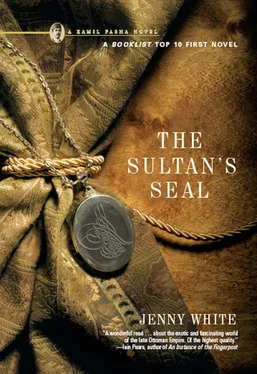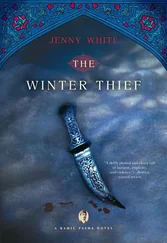Jenny White - The Sultan's seal
Здесь есть возможность читать онлайн «Jenny White - The Sultan's seal» весь текст электронной книги совершенно бесплатно (целиком полную версию без сокращений). В некоторых случаях можно слушать аудио, скачать через торрент в формате fb2 и присутствует краткое содержание. Жанр: Исторический детектив, на английском языке. Описание произведения, (предисловие) а так же отзывы посетителей доступны на портале библиотеки ЛибКат.
- Название:The Sultan's seal
- Автор:
- Жанр:
- Год:неизвестен
- ISBN:нет данных
- Рейтинг книги:5 / 5. Голосов: 1
-
Избранное:Добавить в избранное
- Отзывы:
-
Ваша оценка:
- 100
- 1
- 2
- 3
- 4
- 5
The Sultan's seal: краткое содержание, описание и аннотация
Предлагаем к чтению аннотацию, описание, краткое содержание или предисловие (зависит от того, что написал сам автор книги «The Sultan's seal»). Если вы не нашли необходимую информацию о книге — напишите в комментариях, мы постараемся отыскать её.
The Sultan's seal — читать онлайн бесплатно полную книгу (весь текст) целиком
Ниже представлен текст книги, разбитый по страницам. Система сохранения места последней прочитанной страницы, позволяет с удобством читать онлайн бесплатно книгу «The Sultan's seal», без необходимости каждый раз заново искать на чём Вы остановились. Поставьте закладку, и сможете в любой момент перейти на страницу, на которой закончили чтение.
Интервал:
Закладка:
He leans forward, props both hands on the table, and takes a deep breath. He doesn’t know what to say.
“Please sit, Kamil Bey.” Sybil regally indicates the chair at his side. “I know you’re very busy, but since you came all this way”-she smiles brightly at him-“I would like to be of help.”
Kamil sits and, for a brief moment, regards the objects on the table without seeing them, then looks at her. “Thank you, Sybil Hanoum.” He relies on her to know what he means.
Sybil pulls the cloth bundle nearer, unwraps it again, playing her fingers lightly across the objects assembled there.
“I don’t know about the shoes, but it seems the type she would wear. She wasn’t terribly fashionable, and this is a common enough shoe in Europe. Turkish ladies, you know, prefer leather slippers, like this one here.” She points to a torn and badly soiled slipper. “Wherever did you find these things?”
“We found the shoes and the blouse in the forest behind Ismail Hodja’s house in Chamyeri.”
“These,” she adds, pointing to the hair comb and mirror, “are quite common. They could belong to anyone.” She touches her thumb to the blade of the knife. “Sharp. Was this found with the other things?”
“These things are from a place north of there.”
“Do you suspect Ismail Hodja, then?”
Kamil pauses, then draws a deep breath. “No.”
Sybil brushes her hand across his sleeve. “Does this help you at all?”
“It confuses matters. She drowned in salt, not sweet water. But what was she doing at the pond?”
“Maybe she fell into the Bosphorus and someone hid her clothes at the pond later,” Sybil suggests.
“We thought we had found the place where she drowned, a sea hamam. It’s closed for the season, but someone used it recently. There was no evidence, though, that anyone was killed there, just a dead dog we found nearby.” He shrugs. “Dogs are everywhere. Who is to say that this particular dog has anything to do with the murder?”
“Why a dog?”
“The fishermen heard a dog bark that night.” He smiles wryly. “I know. Not much to go on.”
“So she could have been pushed into the strait anywhere.”
“What we really need to know is where she drank the tea that paralyzed her before she was pushed. A young woman like that might have been able to save herself otherwise.”
“Does datura paralyze you?”
“It makes it difficult to move your limbs and to breathe. It depends on the dose. People don’t die right away. It can take hours. First their throat becomes dry and they have difficulty swallowing. Their pupils dilate and don’t respond to light. They can become blind. There’s a slow paralysis of the limbs, vertigo, hallucinations. But she didn’t die from that. She drowned.”
Sybil feels her throat constricting. She does not move, but Kamil notices her pale face and the beads of sweat on her upper lip. He lays his hand on her shoulder.
“Sybil Hanoum, are you all right? I’m so sorry. That was needlessly graphic. I do apologize.”
“No, no need to apologize. I want to know.” Sybil’s eyes meet his. “I need to know.”
The space between them seems to shrink by some formula of physics as yet undiscovered. Their lips meet. Suspended in a universe that begins and ends at the intersection of their skin-until Maisie’s footfalls outside the door repeal the wonder.
27
Ifelt numb and somehow relieved. After I had stumbled out of the forest onto the grounds, the women who had gathered for the picnic led me to the pasha’s garden house and laid me on a chaise. They crouched around me, their whispering voices lilting with concern, hissing with curiosity. I remember Violet’s brown face leaning over me. One of the women sprinkled my hands and face with rosewater. The smell of roses made me feel ill and the rosewater, as it fell, burned my skin. I remember twisting violently to get away from it and the silver ewer crashing to the ground. The smell became overpowering and I vomited. Then I finally slid into the blackness that had been waiting invitingly at the edge of my vision.
I woke to a man’s face by my chest and started back with fear. The man drew away, but continued to sit in the chair by my side. Violet sat grimly on my other side, clutching my hand. I turned and smiled at her. The world was only as deep as the people standing beside me.
The man was clean-shaven, making his face look like that of a child, but his voice was low and assured. He spoke with a pronounced French accent.
“I am the pasha’s physician. You need not be concerned. You are safe now.”
I stared at him. I was safe? I began to remember. Had they found him? Would I be arrested?
“Can you tell us what happened?”
Would anyone believe me?
“Amin Efendi.”
“He has been taken to hospital. He was unable to tell us anything. Were you attacked by thieves?” His face betrayed anxiety that brig-ands were nearby and had penetrated the pasha’s pleasure gardens.
The pain spread outward from my loins until I glowed with it. It made me feel strangely powerful. I told him everything.
I was brought home, put directly to bed, and sedated with a tincture of opium. Violet lingered downstairs. The pasha himself came, she told me, along with his doctor. Papa stood frozen by the door. Aunt Hüsnü leaned against the mantelpiece. The pasha apologized that such a terrible thing had happened while Papa’s family had been under his protection. Violet said that when they finished, Papa tried to say something in response, but was unable to speak. The two men helped him to a chair and brought him a glass of brandy. Aunt Hüsnü’s expression, however, did not change, Violet noted. When the men had settled Papa into his chair and had managed to calm him somewhat, Aunt Hüsnü offered them refreshments. They declined and, embarrassed and confused as to what else to do, took their leave.
When I woke, I found Papa sitting on the divan, looking out my window, smoking with a soldier’s intensity. The glass tray beside him was full of cigarette stubs. When he heard the bedcovers rustle as I attempted to sit up, he turned his face to me, but it was shadowed and I could not read his expression. Did he believe me? Blame me? What would he do now? I was too inexperienced to know what repercussions this would have on Papa, but knew well enough that the honorable standing of a man’s family always affected his career.
“I’m sorry, Papa.”
He did not seem to hear me, so I repeated it more loudly.
“I’m very sorry, Papa. Please forgive me.”
Papa stood and walked slowly toward me. He settled himself with a sigh onto the chair next to my bed. His big body in its uniform of dark blue worsted looked too large and out of place in this room of delicate pastel embroideries and doilies. Lace fringe from my bedsheet clung incongruously to his woolen trousers.
“Jaanan.” He stopped, embarrassed. He took a cigarette from his pocket, lit it, and inhaled deeply.
“Jaanan, I haven’t been able to provide you with a good upbringing,” he said into the smoke. “You’ve grown up wild. I blame myself for that.”
“But Papa-”
“You must listen.” His voice had regained the familiar clipped tones of authority, but I could hear the urgency in it. “This family has acquired a formidable enemy. Amin Efendi.” He choked at the title. Efendi is not only a title of honor, but implies an exemplary lifestyle, a man of honor. “He has lost his position at the palace and the support of his patron, but he still has other powerful friends. And he has lost an eye.” Here Papa looked at me curiously. The cigarette dangling between his fingers released arabesques into the air.
Читать дальшеИнтервал:
Закладка:
Похожие книги на «The Sultan's seal»
Представляем Вашему вниманию похожие книги на «The Sultan's seal» списком для выбора. Мы отобрали схожую по названию и смыслу литературу в надежде предоставить читателям больше вариантов отыскать новые, интересные, ещё непрочитанные произведения.
Обсуждение, отзывы о книге «The Sultan's seal» и просто собственные мнения читателей. Оставьте ваши комментарии, напишите, что Вы думаете о произведении, его смысле или главных героях. Укажите что конкретно понравилось, а что нет, и почему Вы так считаете.












